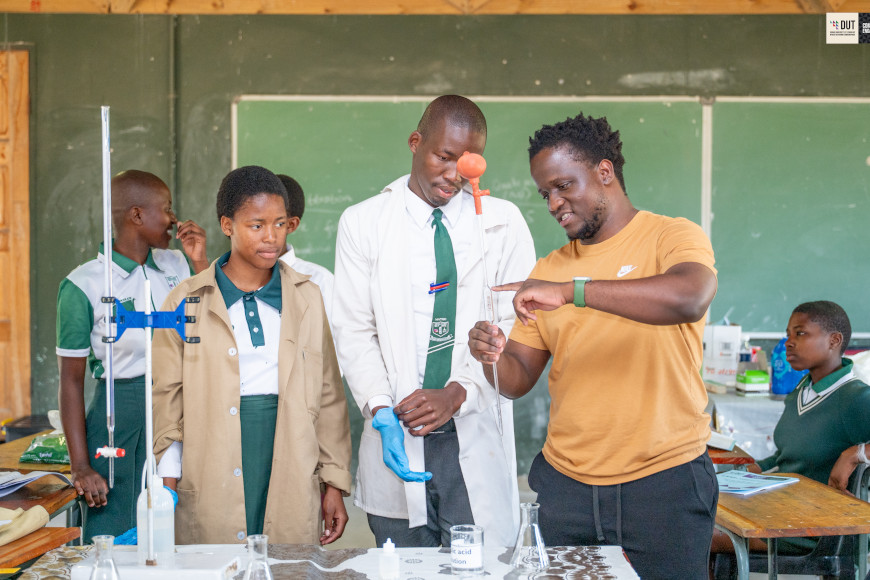The Durban University of Technology (DUT) Community Engagement, in collaboration with the DUT Chemistry Department and the Mahlabathini Circuit Management Centre (CMC), successfully hosted the Mahlabathini Science Week from 14 to 18 July 2025. This impactful initiative reached 50 high schools in Ulundi, engaging with more than 1,600 learners from the Mahlabathini Circuit.
The workshops were held at several venues across the circuit, including Mnyamana High, Ivungu High Hall, Nsabekhuluma High Hall, Tholukukhanya High Hall, Ulundi Teacher Development Centre, Masibumbane High Hall, Mpungamhlophe High Hall, Nsikayendlu High, Zwelonke High Hall, and Mthunziwoxolo High.
Science Week forms part of the broader Mahlabathini Schools Engagement Programme (MSEP), which was launched in 2020 to support schools in the Zululand District. The programme aims to improve access to quality education and address specific challenges faced by rural schools. One of its primary objectives is to improve learner performance in Physical Sciences by promoting conceptual understanding through hands-on, interactive learning.
Since its inception, the MSEP has contributed to notable academic improvements, particularly in science subjects. The Mahlabathini Circuit’s matric pass rate increased from 81.27% in 2023 to 85.51% in 2024, a testament to the programme’s contribution to growing impact.
Mrs Xoliswa Cele, Chief Education Specialist in the Mahlabathini CMC, expressed her appreciation for the DUT team’s efforts. “I am very thankful to the DUT team for your efforts and for investing your time in our children. Your hard work and dedication are evident in the rise of our science results every year,” she said.
Throughout the week, learners participated in interactive workshops facilitated by DUT Chemistry Department staff and postgraduate students. The sessions featured live science experiments aligned with the Grade 12 Physical Science CAPS curriculum, giving learners practical experience and a deeper understanding of key scientific principles.
Sbahle Mbatha, a Grade 12 learner from Vukuza High School, shared her excitement: “Honestly, it was my first time seeing a live experiment. I’ve always watched it on the school laptop. I wish we could have done more experiments. Science Week will help us improve our Physical Science marks as we now have a better understanding of what is going on.”
Sphindile Mdletshe, a Grade 12 learner from Mthunziwoxolo Secondary School, added, “I really enjoyed the experiments and finally putting theory into practice. I do wish the project could also include other sessions we find challenging, like Newton’s laws of motion and vertical projectile motion.”
In addition to the science experiments, learners received career guidance and educational materials aimed at improving learning outcomes and assisting with tertiary education applications. The programme seeks to inspire learners to pursue further studies in science and technology while equipping them with the tools needed for success.
Dr Phathisanani Hloma, a lecturer in the Chemistry Department and one of the facilitators, reflected on the personal and professional growth he has experienced through his involvement. “This programme has always improved my leadership abilities. Being a team leader for Team B took me out of my comfort zone and taught me how to work better with a team. I’ve learned so much from the other teams and leaders. I definitely see myself continuing to participate, most of the initial challenges have been resolved, and the programme is now at its peak.”
Samora Buthelezi, a PhD student and facilitator from the Chemistry Department, also praised the initiative. “This was a great experience, and I would definitely do it again. Learners need to take advantage of opportunities like this, it will help them do well in their studies and improve their marks.”
Mr Dlodlo, Principal of Nhlungwana High School, emphasised the value of the programme for under-resourced schools. “We are schools that are unable to perform science practicals, so our learners benefit greatly from this programme. We feel blessed and hope to continue receiving this support in the years to come.”
The Mahlabathini Science Week continues to stand as a beacon of hope, collaboration, and academic advancement in rural communities, embodying DUT’s commitment to community engagement and educational transformation.
Pictured: DUT Khayelihle Zikhali with learners during the Science Week 2025.
Photographer: Mnqobi Ngobese
Phumeza Msongelwa

